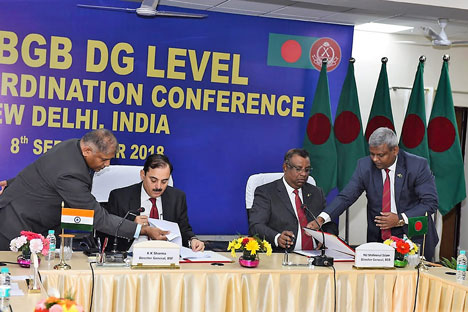
New Delhi: Rohingya refugees in India, who the Centre wants to deport, are shifting to "slightly friendly" Bengal that has set up special camps for nearly 70 such families, BSF director-general K.K. Sharma said on Friday.
The comments were seen by many as an instance of the BSF boss "parroting the political line".
Speaking at the end of the DG-level talks in New Delhi between the BSF and the Border Guards Bangladesh, Sharma asserted that of late there had not been any large-scale influx of Rohingya refugees into India.
"There has not been any large-scale influx of Rohingya into India. Rohingya refugees who are already living in the country are also under pressure at some places and so they are now moving to Bengal, which is slightly friendly to them. They (Bengal) have set up camps for Rohingya refugees coming from within the country, and not from Bangladesh," Sharma said at a joint news conference he held with his visiting Bangladeshi counterpart.
Sharma said the BSF had, through intelligence agencies, got the total number of Rohingya refugees living in Bengal checked and found that around 70-odd families had recently moved to the state from several places in India.
"So, I am very happy to say the BSF has successfully contained the influx of the Rohingya and we have not allowed any intrusion so far," he said.
The Centre and the Bengal government have been at loggerheads over the Rohingya - the Centre wants to deport all the refugees, but chief minister Mamata Banerjee has publicly expressed her empathy for them.
In a report to the Centre, security agencies have highlighted that some Rohingya families had been accommodated in villages in South 24-Parganas by NGOs with the support of the state government.
A section of home ministry officials, however, said the Rohingya issue was political and Sharma should have avoided directly accusing the Bengal government.
"Being the head of a paramilitary force, he should not have named the Bengal government. It seems he is parroting the political line," an official said.
Another official said BJP leaders had blamed the Mamata government for sheltering Rohingya refugees. "In the run-up to the 2019 Lok Sabha polls, it is going to be a big election issue. It seemed Sharma was making a political statement."
The BSF, which reports to the Union home ministry, guards the 4,096km international border with Bangladesh that runs through Bengal, Assam, Tripura, Meghalaya and Mizoram.
In September last year the Centre had in an affidavit before the Supreme Court described the Rohingya refugees as a security threat. The government had also claimed evidence that 40,000 Rohingya refugees living in India had links with terrorist groups in Pakistan and other countries.
The apex court had put on hold the Centre's plan to deport the Rohingya refugees.
Last year, Sharma had said the BSF had apprehended 87 Rohingya near the India-Bangladesh border till October and that 76 of them had already been pushed back to Bangladesh. But none of them was found to have links with any terror organisation.
Sharma said on Friday that the BSF was "alive" to the influx of Rohingya people into India.
"We are aware that a large number of Rohingya are assembled in Bangladesh and from time-to-time some small groups did try to enter India, but I am very happy to say that we did not let them succeed," he said.
Replying to a question on the Rohingya, Border Guards Bangladesh DG Maj Gen Md Shafeenul Islam said the force was also alert to prevent unauthorised movement of Rohingya in the neighbouring country and towards the border areas.
"There are a large number of Rohingya along the Bangladesh-Myanmar border and all the security agencies, including the BGB, are keeping them confined to the area allocated to them. Yet, in very few cases, they are slipping out of the camps and we are finding them in some other parts of Bangladesh.
"Our security forces are very much alert and as we detect them, we get them back to our camps again. We are very keen on keeping them in the designated camps," he said, adding any decision on this was the prerogative of the Bangladeshi government.










